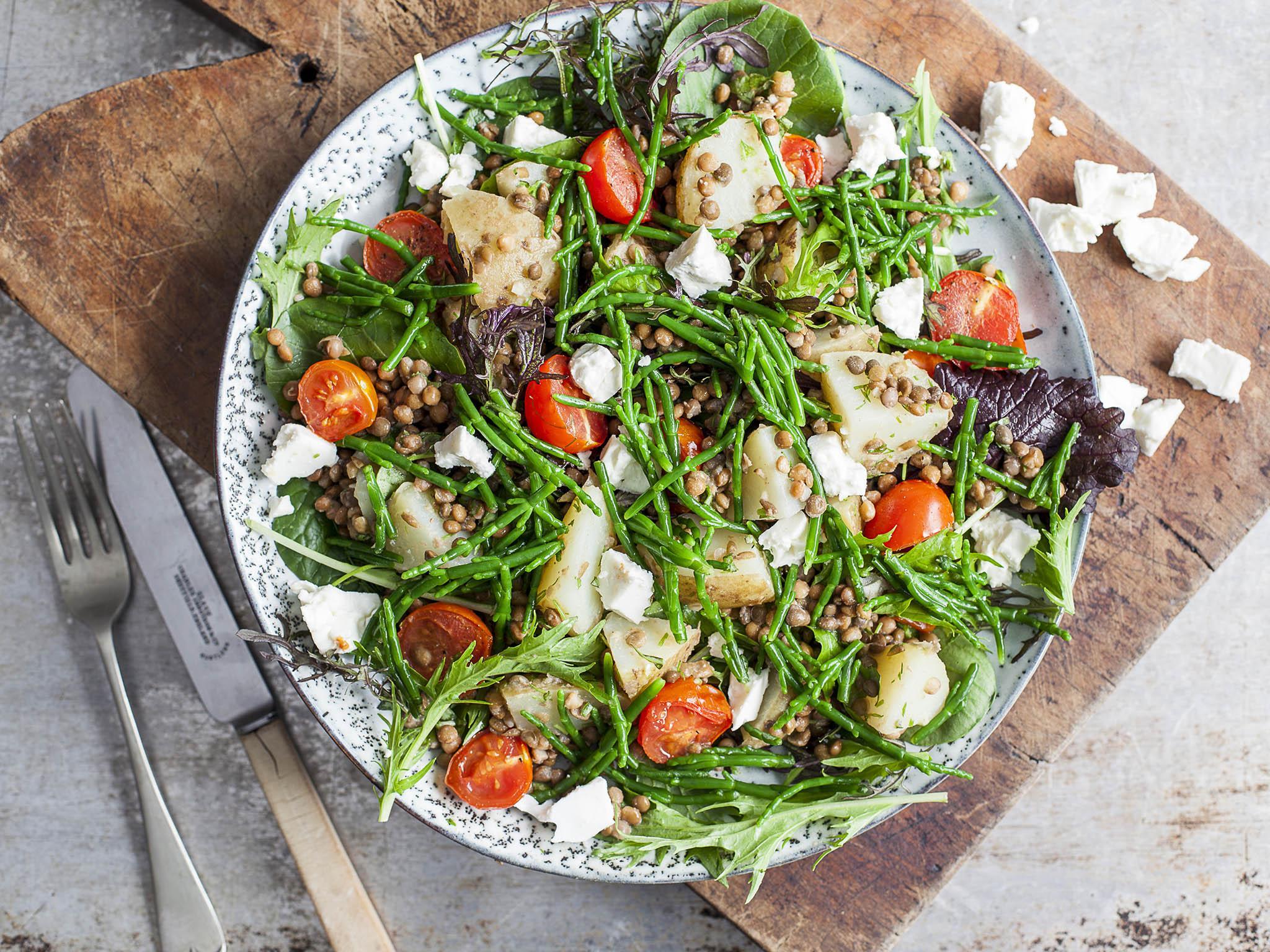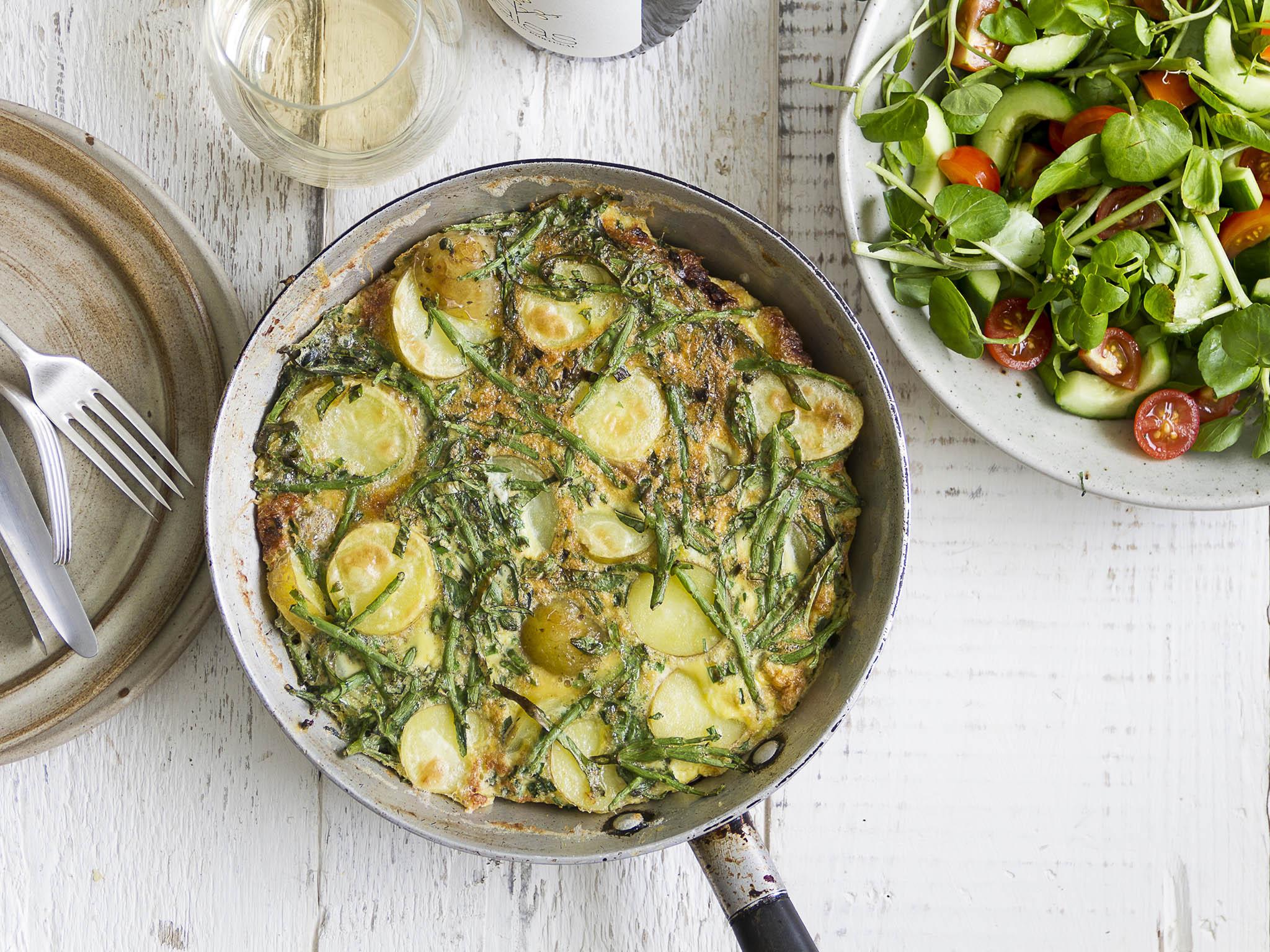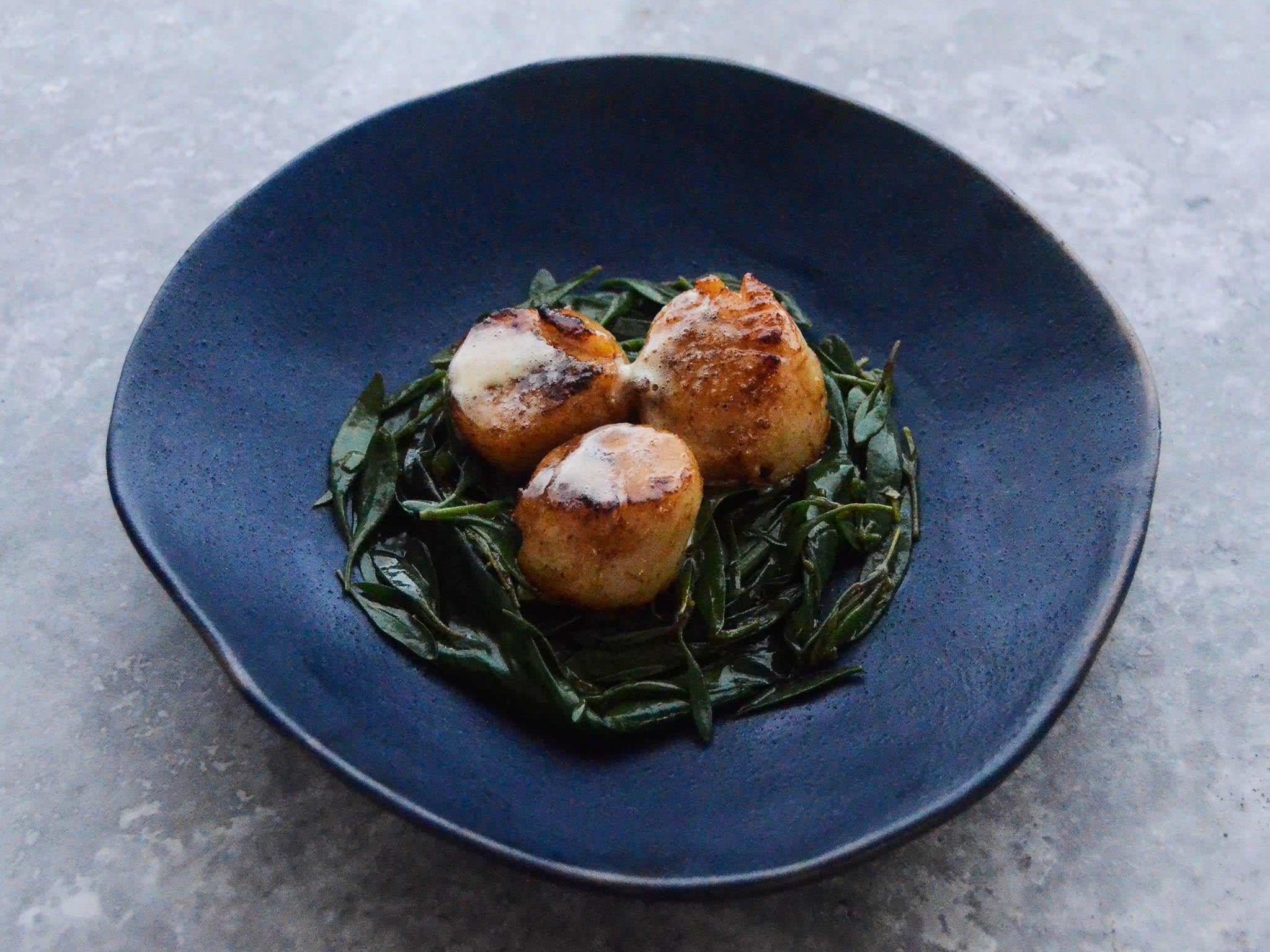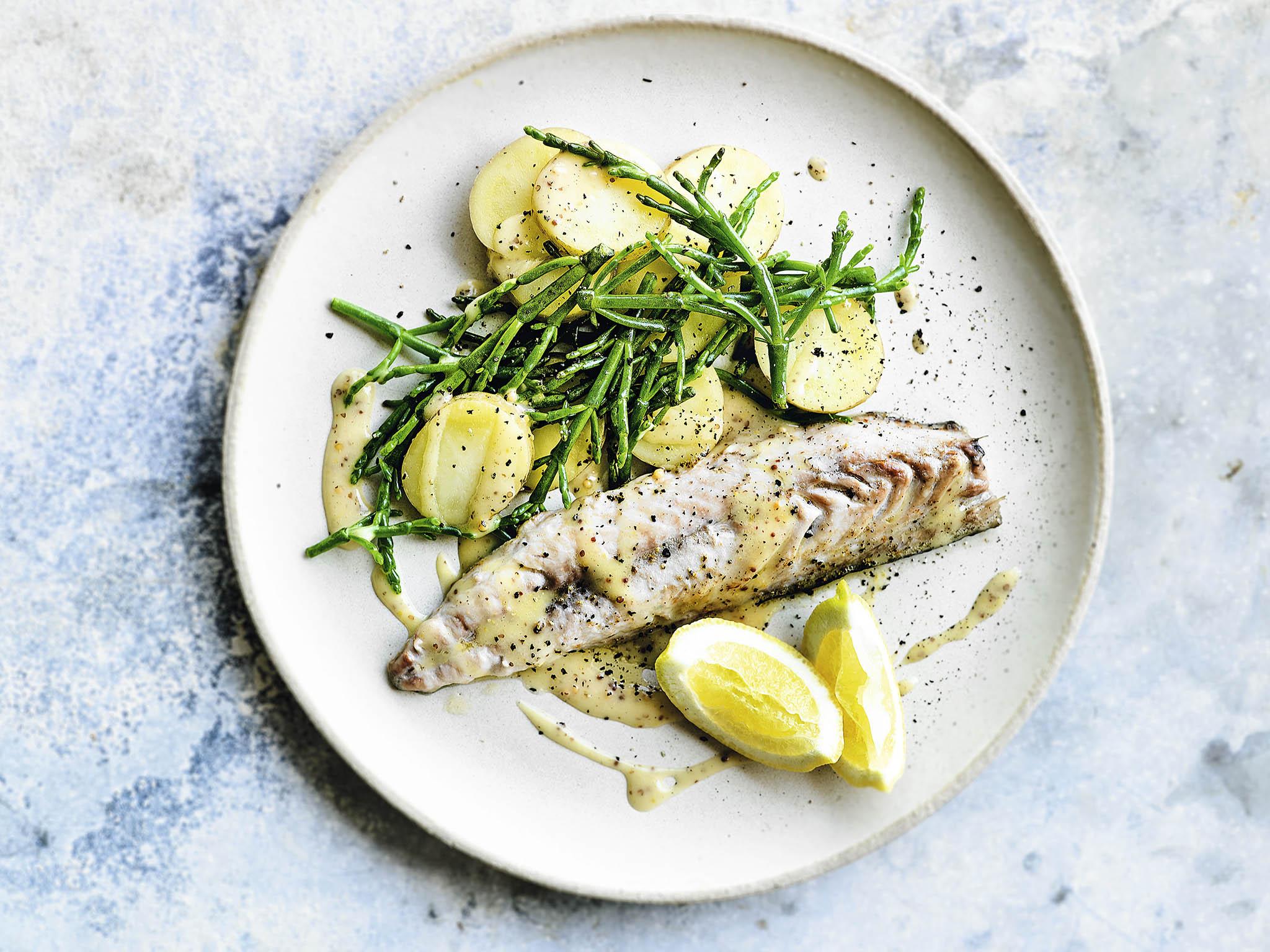Four seasonal samphire recipes for August
Technically not a vegetable, this succulent has two variants: one grows near marshes, while rock samphire comes from coastal areas. It’s crisp and salty and can be cooked al dente or eaten raw

Your support helps us to tell the story
From reproductive rights to climate change to Big Tech, The Independent is on the ground when the story is developing. Whether it's investigating the financials of Elon Musk's pro-Trump PAC or producing our latest documentary, 'The A Word', which shines a light on the American women fighting for reproductive rights, we know how important it is to parse out the facts from the messaging.
At such a critical moment in US history, we need reporters on the ground. Your donation allows us to keep sending journalists to speak to both sides of the story.
The Independent is trusted by Americans across the entire political spectrum. And unlike many other quality news outlets, we choose not to lock Americans out of our reporting and analysis with paywalls. We believe quality journalism should be available to everyone, paid for by those who can afford it.
Your support makes all the difference.It’s known as the patron saint of fisherman, who found it growing in coastal areas, and is also as sea asparagus (which it’s quite similar to) or sea pickle.
If you’re out foraging, it’s best between July and August. If you’re buying it in a shop, look for healthy plants that don’t look like they’re wilting, but don’t buy too much as it doesn’t last longer than a few days.
Cook it by boiling for a few minutes, or steam it, but don’t forget it to wash it thoroughly beforehand. Be sure not to add salt, as it certainly won’t need it.
Samphire, new potatoes and lentils with roasted cherry tomatoes and feta
Prep and cook time: 25 mins
Serves 2
Living by the coast, samphire has always been a favourite. There are two varieties; sea (usually a pick your own affair) or marsh, both commonly used with fish. Its distinctive salty flavour lends itself to vegetarian dishes too; it’s brilliant with spuds. This salad uses tomatoes for softness and sweetness, with lentils for an earthy note and protein.
Samphire grows in sandy areas so let it sit in a bowl of cold water for a couple of minutes to allow any grit to sink to the bottom, then carefully lift it out and give it a quick extra rinse before use.
250g cherry tomatoes
400g new potatoes
100g samphire
1 tin dark green speckled lentils
10g basil
8g dill
1 garlic clove
1 tablespoon Dijon mustard – add to taste
1 lemon
50g salad leaves
75g feta cheese
Put your oven on to 200C/gas 6. Halve the tomatoes. Lay them cut side up on a baking tray, season with salt and pepper and drizzle with a tablespoon of oil.
Roast the tomatoes in the hot oven for 10-15 mins, until softening and starting to blister, then remove and keep to one side. Meanwhile, boil a kettle. While it boils, scrub and chop the potatoes into halves or quarters, so they’re roughly evenly sized.
Transfer the potatoes to a saucepan. Add a pinch or two of salt. Bring the pan up to the boil on the hob. Cook until just tender to the point of a knife (approx 12-15 mins) then leave to drain in a colander. Once the potatoes are on, wash the samphire well (see cook’s note). Drain and rinse the lentils in a sieve. They can clump together and look a bit gloopy in the tin, but are fine once rinsed.
Chop half the basil and half the dill leaves. Peel and finely chop 1 garlic clove. In a small bowl, make a dressing by mixing just half of the mustard to start with, with 1 tablespoon of oil, and salt and pepper. Add garlic and a squeeze of lemon juice, both to taste.
Reboil the kettle. Add a little water to another saucepan and blanch (quickly boil) the samphire for 30 secs. Drain and keep to one side. Stir the lentils into the mustard dressing together with half the chopped herbs. Season to taste with salt and pepper. If you like, add a little more mustard, garlic or lemon juice, to taste.
On serving plates, layer the salad leaves, potatoes, lentils, roasted tomatoes and samphire. Top with crumbled feta and the remaining chopped herbs.
Recipe from Riverford Organic Farm (riverford.co.uk)

New potato, samphire and herb frittata
Samphire is often associated with fish, as it naturally grows on the seashore, in estuaries or marshland, but there’s no reason why vegetarians can’t enjoy its salty sweetness. It pairs well with new potatoes and herbs; we’ve used aromatic basil and punchy chives. Because of the salty samphire, watch your additional seasoning. Resting the frittata for a few minutes will allow it to set properly, making slicing it easier; egg dishes like this are always better warm rather than piping hot.
Prep and cook time: 40 mins
Serves 2
300g new potatoes
1 bulb wet garlic
100g samphire
2 tbsp chives
20g basil
6 eggs
25g butter
Put a large pan of salted water on to boil. Scrub the potatoes clean, leaving the skins on, then thickly slice them to around 1cm thick. Finely shred 1 tablespoon of wet garlic (it is mild, so use a little more if you like garlic). Make sure the samphire is washed well. Finely chop or use scissors to snip 2 tablespoons of chives. Shred the basil leaves. Break the eggs into a large bowl and lightly beat them.
Boil the potatoes for approx 5 mins, until only just tender. Drain and leave for 2 minutes for excess water to evaporate. Mix them with the eggs, with the samphire, basil and chives. Season, adding salt very lightly.
Put your grill on a low-medium heat. Melt the butter and a splash of oil in a non-stick frying pan. Stir-fry the wet garlic for 1 minute. Carefully tip in the egg and potato mixture. Make sure the mixture is evenly distributed over the pan. Cook on a very low heat for about 5 minutes, enough to set the bottom third-to-half (test by lifting a small edge with a spatula).
Finish under the grill for a few minutes, until just set. Leave it to cool for 5-10 minutes. Serve the frittata in wedges, with salad or another side of choice.
Recipe from Riverford Organic Farm (riverford.co.uk)

Sea side veg
Prep and cook time: 15 mins
Serves 2-3
This salty sea vegetable side dish comes from Miles at Forager. He says: “Seaside veg is precisely that: wild veg from the seaside that forms a wonderful side to any dish. Rock samphire is a herb not a vegetable, so use sparingly to add depth of flavour to the rest of the sea vegetables.” This dish can be enjoyed with all manner of fish and meat, such as these plump pan-fried scallops.
100g sea aster
50g sea purslane
1 tbsp rock samphire (use sparingly – its a herb not a vegetable!)
50g butter
1 lemon
Drizzle of plain oil
Heat a drizzle of oil and a knob of butter in a pan. Remove the stalks from aster and scrub clean with small brush (ideally toothbrush size or similar). Chop the stalks into small pieces then add to the pan and sauté on a low heat, stirring occasionally.
Meanwhile, clean the aster leaf blades (the flat green bits that remain after removing stalks) and pat dry with a tea towel. Pick leaves from the woody stalks of the sea purslane, discarding the stalks as you go. Finely chop the rock samphire.
Add all the leaves to pan with the aster stalks and fry gently for a minute or so (frying the leaves rather than boiling means they retain their full gambit of saltiness). Squeeze a little lemon juice over the sea vegetables and serve.
Recipe from Farmdrop (farmdrop.com)

Grilled mackerel with samphire
Prep and cook time: 20 minutes
Serves 2
20g butter
2 frozen mackerel fillets
300g Charlotte potatoes, cut into 5mm slices
90g samphire, washed
½ bunch salad onions, trimmed and sliced into 1cm lengths
3 tbsp honey and mustard dressing
Preheat the grill to medium. Line a baking tray with foil and melt half the butter. Brush a little over the foil, place the mackerel on top and brush with the remaining melted butter. Grill for 12 minutes until thoroughly cooked.
Cook the potatoes in a pan of boiling water for 8-10 minutes, until tender. Add the samphire and cook for 1 more minute. Drain.
Melt the remaining butter in the saucepan and cook the salad onions for 1 minute. Tip in the potatoes and samphire and mix well. Transfer to plates, top with the mackerel fillets and serve drizzled with dressing.
Image and recipe courtesy of Waitrose
Join our commenting forum
Join thought-provoking conversations, follow other Independent readers and see their replies
Comments